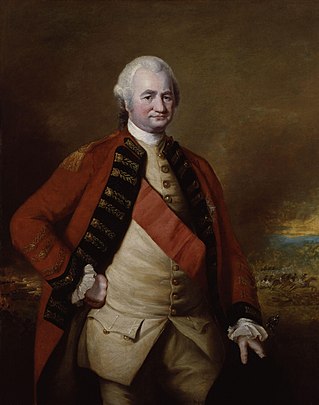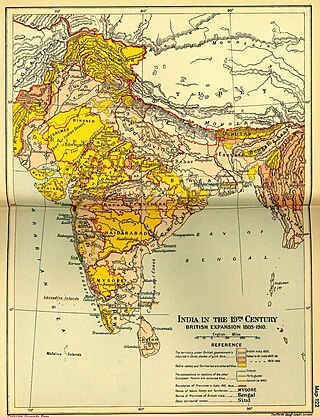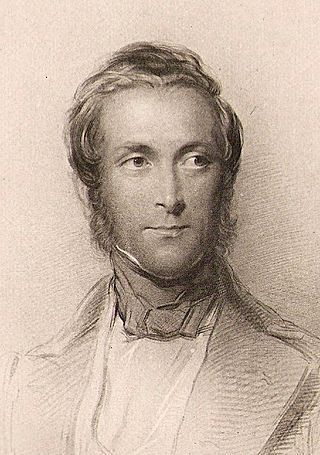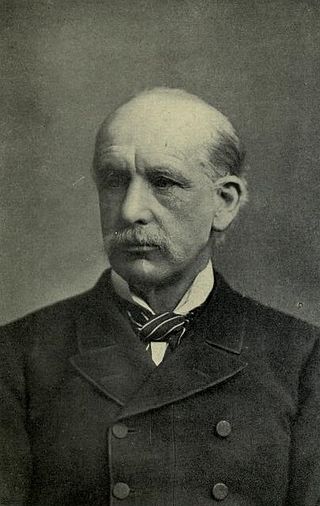Related Research Articles

Robert Clive, 1st Baron Clive,, also known as Clive of India, was the first British Governor of the Bengal Presidency. Clive has been widely credited for laying the foundation of the British East India Company (EIC) rule in Bengal. He began as a writer for the EIC in 1744 and established Company rule in Bengal by winning the Battle of Plassey in 1757. In return for supporting the Nawab Mir Jafar as ruler of Bengal, Clive was guaranteed a jagir of £30,000 per year which was the rent the EIC would otherwise pay to the Nawab for their tax-farming concession. When Clive left India in January 1767 he had a fortune of £180,000 which he remitted through the Dutch East India Company.

Company rule in India was the rule of the British East India Company on the Indian subcontinent. This is variously taken to have commenced in 1757, after the Battle of Plassey, when the Nawab of Bengal Siraj ud-Daulah was defeated and replaced with Mir Jafar, who had the support of the East India Company; or in 1765, when the Company was granted the diwani, or the right to collect revenue, in Bengal and Bihar; or in 1773, when the Company abolished local rule (Nizamat) in Bengal and established a capital in Calcutta, appointed its first Governor-General of Fort William, Warren Hastings, and became directly involved in governance. The East India Company significantly expanded its influence throughout the Indian subcontinent after the Anglo-Mysore Wars, Anglo-Maratha Wars, and Anglo-Sikh Wars. Lord William Bentinck became the first Governor General of India in 1834 under the Government of India Act 1833. The Company India ruled until 1858, when, after the Indian Rebellion of 1857 and the Government of India Act 1858, the India Office of the British government assumed the task of directly administering India in the new British Raj.

Sir John William Kaye was a British military historian, civil servant and army officer in India. His major works on military history include a three-volume work on The History of the Sepoy War in India. This work was revised later by George Bruce Malleson and published in six volumes in 1890 as Kaye and Malleson's History of the Indian Mutiny.

Colonel George Bruce Malleson was an English officer in India and the author of several works on British Indian colonial history.

John Russell Colvin was a British administrator of the East India Company, and Lieutenant-Governor of the North-Western Provinces from 1853 until his death from cholera during the Indian Rebellion of 1857.

The Battle of Plassey was a decisive victory of the British East India Company, under the leadership of Robert Clive, over the Nawab of Bengal and his French allies on 23 June 1757. Robert Clive was paid £1 million by the Jagat Seth family - a rich Indian family business group - to defeat Siraj-ud-Daulah. The victory was made possible by the defection of Mir Jafar, Nawab Siraj-ud-Daulah's commander in chief who was also paid by the Jagat Seths. The battle helped the British East India Company take control of Bengal in 1772. Over the next hundred years, they continued to expand their control over vast territories in the rest of the Indian subcontinent, including Burma.

James Andrew Broun-Ramsay, 1st Marquess of Dalhousie, known as the Earl of Dalhousie between 1838 and 1849, was a Scottish statesman and colonial administrator in British India. He served as Governor-General of India from 1848 to 1856.

Sir Alfred Comyn Lyall was a British civil servant, literary historian and poet.

Major-General Sir John Malcolm GCB, KLS was a Scottish soldier, diplomat, East India Company administrator, statesman, and historian.

The Fourth Anglo-Mysore War was a conflict in South India between the Kingdom of Mysore against the British East India Company and the Hyderabad Deccan in 1798–99.

Sir William Wilson Hunter was a Scottish historian, statistician, a compiler and a member of the Indian Civil Service.

Flora Annie Steel was a writer who lived in British India for 22 years. She was noted especially for books set in the Indian sub-continent or connected with it. Her novel On the Face of the Waters (1896) describes incidents in the Indian Mutiny.

Sir Auckland Colvin (1838–1908) was a colonial administrator in India and Egypt, born into the Anglo-Indian Colvin family. He was comptroller general in Egypt (1880–2), and financial adviser to the Khedive (1883–87). From 1883–92 he was back in India, first as financial member of council, and then as Lieutenant-governor of the North-West Provinces and Oudh. He founded Colvin Taluqdars' College in Lucknow.

A subsidiary alliance, in South Asian history, was a tributary alliance between an Indian state and a European East India Company.
William Holden Hutton was a British historian and a priest of the Church of England. He was Dean of Winchester from 1919 to 1930.

Sir Henry Miers Elliot was an English civil servant and historian who worked with the East India Company in India for 26 years. He is most known for The History of India, as Told by Its Own Historians based on his works, published posthumously in eight volumes, between 1867–1877 in London.

The Sachin State was a princely state belonging to the Surat Agency, former Khandesh Agency, of the Bombay Presidency during the era of the British Raj. Its capital was in Sachin, the southernmost town of present-day Surat district of Gujarat State.
The People of India is a title that has been used for at least three books, all of which focussed primarily on ethnography.
Demetrius Charles De Kavanagh Boulger was a British author.
References
- 1 2 3 4 H. P. (1891). "Akbar (Rulers of India) by G. B. Malleson; Dupleix by G. B. Malleson; The Marquess of Dalhousie by William Wilson Hunter; Lord Lawrence, (English Men of Action) by Richard Temple". Revue Historique. 47 (2): 387–393. JSTOR 40938228.
- 1 2 3 H. P. (1892). "Lord Clive, (English Men of Action) by Charles Wilson; Warren Hastings by Alfred Comyn Lyall; Warren Hastings, (Rulers of India) by L. J. Trotter; The Earl of Mayo by William Wilson Hunter". Revue Historique. 48 (2): 387–400. JSTOR 40939452.
- 1 2 ( Chatterjee 2004 , pp. 65–102)
- 1 2 H. P. (1895). "Lord Clive, (Rulers of India) by G. B. Malleson; Lord Wellesley by W. H. Hutton; Land Revenue and Tenure in British India by B. H. Badenpowell". Revue Historique. 59 (2): 404–408. JSTOR 40939319.
- ↑ Lane-Poole, S. (October 1894). "The Marquess Wellesley, K. G by W. H. Hutton". The English Historical Review. 9 (36): 811–813. JSTOR 547604.
- ↑ "Rulers of India: Mountstuart Elphinstone by J. S. Cotton". The English Historical Review. 7 (28): 813. October 1892. JSTOR 547455.
- ↑ Charles Edward Buckland (1906). Dictionary of Indian Biography. Swan Sonnenschein. p. 51.
- ↑ Hutton, W. H. (July 1895). "John Russell Colvin, the Last Lieutenant-Governor of the North-West under the Company by Auckland Colvin". The English Historical Review. 10 (39): 604. JSTOR 547869.
- ↑ "Rulers of India: Clyde and Strathnairn by Owen Tudor Burne". The Journal of the Society of Arts. 40 (2039): 123–124. 18 December 1891. JSTOR 41328306.